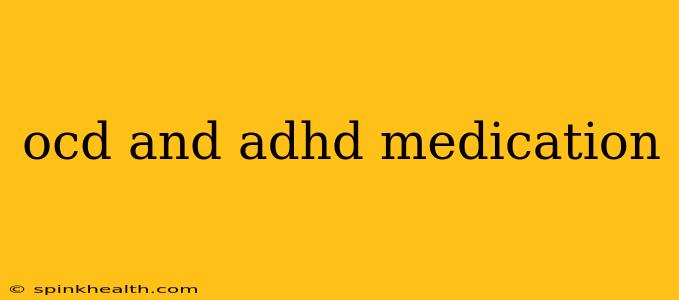Navigating the Complex World of OCD and ADHD Medication: A Personal Journey
My journey with obsessive-compulsive disorder (OCD) and attention-deficit/hyperactivity disorder (ADHD) has been a winding road, paved with both challenges and triumphs. It's a journey many others share, and one that often involves navigating the complex world of medication. This isn't a medical guide, but rather a personal reflection aiming to illuminate some of the common questions and experiences around managing these conditions with medication.
The initial diagnosis felt like a weight lifted – finally understanding the roots of my struggles. However, finding the right medication regimen was a process, a trial-and-error experience that required patience, open communication with my psychiatrist, and a willingness to adapt. The interplay between OCD and ADHD medications added another layer of complexity.
What Medications are Commonly Prescribed for OCD and ADHD?
This is a question best answered by a medical professional, as individual needs vary drastically. However, common medications for OCD often include selective serotonin reuptake inhibitors (SSRIs), such as sertraline (Zoloft) or fluoxetine (Prozac), and sometimes, in conjunction with therapy, clomipramine (Anafranil). For ADHD, stimulant medications like methylphenidate (Ritalin, Concerta) or amphetamine (Adderall) are frequently prescribed, as are non-stimulant options such as atomoxetine (Strattera).
Can You Take Medication for Both OCD and ADHD Simultaneously?
Yes, many individuals with both OCD and ADHD take medication for both conditions simultaneously. However, the specific combination and dosage must be carefully determined by a psychiatrist or other qualified healthcare professional. The interaction between medications needs careful consideration. What works for one person might not work for another. My own experience involved starting with one medication and gradually adding others as needed, under close medical supervision.
What are the Side Effects of OCD and ADHD Medications?
This is another crucial point to discuss with your doctor. Side effects can vary greatly depending on the individual and the specific medication. Common side effects of SSRIs used for OCD can include nausea, insomnia, weight changes, and sexual dysfunction. Stimulant medications for ADHD can cause decreased appetite, insomnia, and increased heart rate. Non-stimulant options like atomoxetine can lead to fatigue and digestive issues. Open and honest communication with your doctor is vital to manage any side effects that arise.
How Long Does it Take for OCD and ADHD Medications to Work?
The time it takes for medications to become effective varies considerably. It can take several weeks, or even months, to see a noticeable improvement in symptoms. Patience is crucial during this initial period, as adjustments to dosage or medication may be necessary. Remember, this is a marathon, not a sprint. Regular check-ups with your doctor are vital to monitor progress and make necessary adjustments.
Are There Alternatives to Medication for OCD and ADHD?
Absolutely! Therapy, particularly Cognitive Behavioral Therapy (CBT) and Exposure and Response Prevention (ERP) for OCD, and behavioral therapy for ADHD, are highly effective treatments. Many individuals find that a combination of medication and therapy provides the best results. Lifestyle changes, such as regular exercise, a healthy diet, and sufficient sleep, can also play a significant role in managing symptoms.
What if Medication Doesn't Work?
If the initial medication regimen isn't effective, don't lose hope. This is a common experience. Your doctor may adjust the dosage, try a different medication, or recommend additional treatments, such as therapy or lifestyle changes. It's a journey of finding the right combination that works best for you.
This is just one person's story, and every individual's experience with OCD and ADHD, and their treatment, is unique. The information shared here should not be considered medical advice. Always consult with a qualified healthcare professional for diagnosis and treatment options. Open communication, patience, and a proactive approach are key to finding the right path to managing these conditions.

